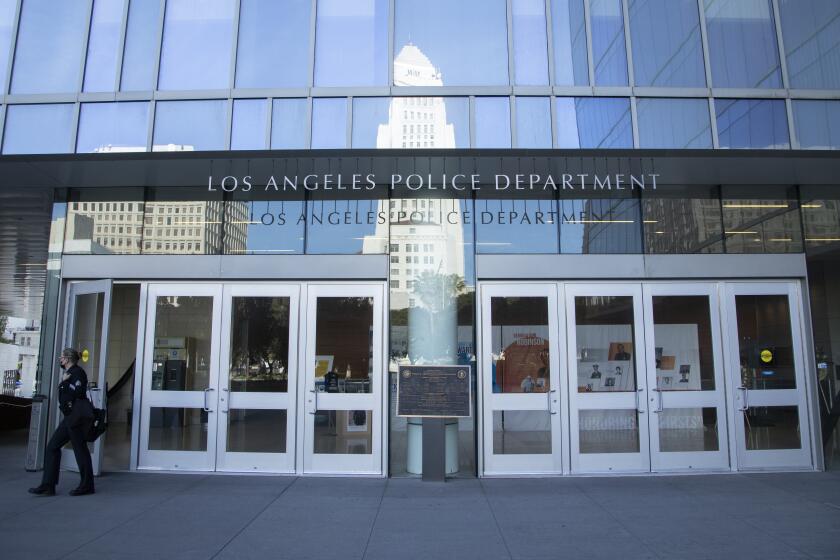Gays Hail City Hall Allies Against Bias
Rob Kramme, president of a largely homosexual political group, first drafted an ordinance banning employment discrimination based on sexual orientation three years ago--but it didn’t get far.
Times have changed, however, and so has the City Council.
Citing a “pretty major shift in the face of the council,” Kramme’s group, the Long Beach Lambda Democratic Club, is ready to bring the proposed law before the city next month. And a majority of the council’s nine members said in interviews that they are ready to approve an ordinance making it illegal to discriminate in employment based on sexual preference.
“I will support it. I think it’s a good law for the city,” Councilman Clarence Smith said.
Also saying they support the concept are council members Evan Anderson Braude, Thomas Clark, Wallace Edgerton and Ray Grabinski. Although some of the five said they would suggest minor changes to the proposal, they said they approved the anti-discrimination concept.
Change in Attitude Seen
Councilman Warren Harwood and Vice Mayor Edd Tuttle said they leaned against such an ordinance, Mayor Ernie Kell declined to comment and Councilwoman Jan Hall could not be reached for comment.
To Kramme, the majority support signals a change in the city’s attitude toward gays and lesbians.
“There’s a very symbolic nature of this issue: that the City of Long Beach will not tolerate discrimination against lesbians and gays for any reason,” Kramme said.
With last year’s election of three new council members--Braude, Grabinski and Smith--the council is “a little more attuned to the needs of the gay and lesbian community and are more willing to show support,” Kramme said.
Relationship Not Always Harmonious
In Long Beach, where gay leaders estimate the “fairly politically aware” homosexual population at about 40,000, the relationship between the city and its gay and lesbian residents has not always been a harmonious one.
Even now, when gay leaders say there is greater tolerance and understanding, some friction remains.
Earlier this month, the council rejected a request by Long Beach Lesbian & Gay Pride Inc. for the city to co-sponsor next month’s annual gay pride parade, help advertise it and waive charges for police and other city services. The council also indicated that it would be reluctant to drop a $1-million liability insurance requirement for a festival that same May 17 weekend.
Gay leaders said they were disappointed, but not surprised. Two years ago, they narrowly won a request to extend the one-day event to a two-day parade and festival. The issue made for some stormy meetings as Christian fundamentalists waving signs and decrying homosexuality unsuccessfully fought the proposal.
Council members supporting the anti-discrimination ordinance said they expect flak from those who ardently oppose homosexuality.
“You have to take positions on issues that you feel are right. You take that regardless of what reaction you may have,” Clark said. “It’s part of the political life and you have to take a stand.”
With the ordinance in its books, Long Beach would join the ranks of cities such as Los Angeles, West Hollywood, Laguna Beach and Sacramento, among others. The law would give the city’s gays and lesbians “some kind of recourse if they are discriminated against,” Kramme said.
No State Ban
State laws already prohibit discrimination in areas such as housing, but do not address discrimination in employment based on sexual orientation. Gov. George Deukmejian last year, as he did in 1984, vetoed a bill that would have banned discrimination against homosexuals.
The ordinance the Lambda Democratic Club proposes says that “Employment discrimination on the basis of sexual orientation exists within the City of Long Beach” and that such discrimination “deprives the residents of the City of Long Beach of life, liberty and property, and poses a substantial threat to the public health, safety and welfare because such discrimination increases and encourages public strife, discord and unrest. . . .”
Therefore, the ordinance continues: “No business establishment within the jurisdiction of the City of Long Beach . . . shall discriminate against any person by failing or refusing to hire or by disciplining or discharging any person or in any manner discriminating against any person with respect to compensation, terms, conditions or privileges of employment, because of the sexual orientation of any person.”
Those violating the ordinance would be subject to damages, a civil penalty of $200, attorney fees and other costs.
Braude said he questions “how involved the city would be in enforcing the ordinance” and said he may ask that a provision allowing the city--along with the aggrieved party--to file suit be deleted.
Would Change Language
Clark said he may also want to tinker with the proposal’s language, but said he could not recall what he would consider changing. But both Braude and Clark said they did not think it would need any major changes for approval.
Councilman Harwood said the proposal “has a whole lot of ramifications” and could adversely affect small-business owners faced with a costly legal battle if charged with discrimination.
Harwood also noted that the city itself “is on record” with its own policy banning discrimination of any kind.
William H. Storey, the city’s personnel director, said there is no provision specifically banning discrimination based on sexual preference or orientation, but the city has general policies saying “it will not discriminate against anybody for any reason.”
A non-discrimination provision in the city’s charter bans discrimination “for any reason which is non-job-related.” The city’s affirmative action policy statement on equal employment opportunity, which covers who the city hires, also bans discrimination.
‘A Little Gun-Shy’
Tuttle said he would be “a little gun-shy about imposing laws that would force people to hire people that have a disease where there are a lot of questions left.”
Tuttle was referring to the fatal AIDS, acquired immune deficiency syndrome, which until recently was mostly confined to male homosexuals and intravenous drug users but is now making inroads into the heterosexual community. The disease is transmitted through contaminated body fluids--such as through sexual intercourse and contaminated needles--and not through casual contact, according to medical authorities. Tuttle, though, said too many questions remain about the virus and how it is transmitted. He said, for example, that he thinks that it is also possible that AIDS could be transmitted through mosquitoes, much like malaria.
Kramme, who said he has been “intensely working” and lobbying for the ordinance these past two months, cited the support of the council majority as recognition that “discrimination against one minority group is discrimination against everyone.”
More to Read
Start your day right
Sign up for Essential California for news, features and recommendations from the L.A. Times and beyond in your inbox six days a week.
You may occasionally receive promotional content from the Los Angeles Times.






